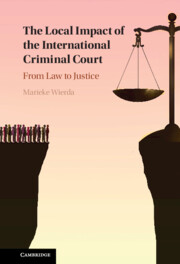Book contents
- The Local Impact of the International Criminal Court
- The Local Impact of the International Criminal Court
- Copyright page
- Contents
- Acknowledgments
- Abbreviations
- Introduction
- 1 A Framework for Assessing the Impact of the ICC
- 2 Systemic Effect I
- 3 Systemic Effect II
- 4 Transformative Effect I
- 5 Transformative Effect II
- 6 Societal Impact I
- 7 Societal Impact II
- 8 Conclusion: From Law to Justice
- Postscript
- Book part
- Index
4 - Transformative Effect I
A Paradigm Shift in Peace Negotiations?
Published online by Cambridge University Press: 06 July 2023
- The Local Impact of the International Criminal Court
- The Local Impact of the International Criminal Court
- Copyright page
- Contents
- Acknowledgments
- Abbreviations
- Introduction
- 1 A Framework for Assessing the Impact of the ICC
- 2 Systemic Effect I
- 3 Systemic Effect II
- 4 Transformative Effect I
- 5 Transformative Effect II
- 6 Societal Impact I
- 7 Societal Impact II
- 8 Conclusion: From Law to Justice
- Postscript
- Book part
- Index
Summary
Chapter 4 discusses transformative effect, that is, the impact of the Rome Statute and the Court on political processes such as peace negotiations, in order to contribute to ending impunity. The chapter discusses the mechanisms of the Rome Statute that seek to balance peace and justice, including Articles 16 and 53 (the “interests of justice” test). It also discusses who determines the interests of victims in peace and justice. The evidence on whether arrest warrants facilitate or hinder peace negotiations is not conclusive, although in Uganda, they may have hindered reaching a final peace agreement. Moreover, in Afghanistan or Libya, amnesties were passed, in spite of the involvement of the ICC. The coming into force of the Rome Statute does not constitute a “paradigm shift” from impunity to accountability as such, but transformative effect may be seen in certain negotiations or peace agreements.
Keywords
- Type
- Chapter
- Information
- The Local Impact of the International Criminal CourtFrom Law to Justice, pp. 116 - 148Publisher: Cambridge University PressPrint publication year: 2023

